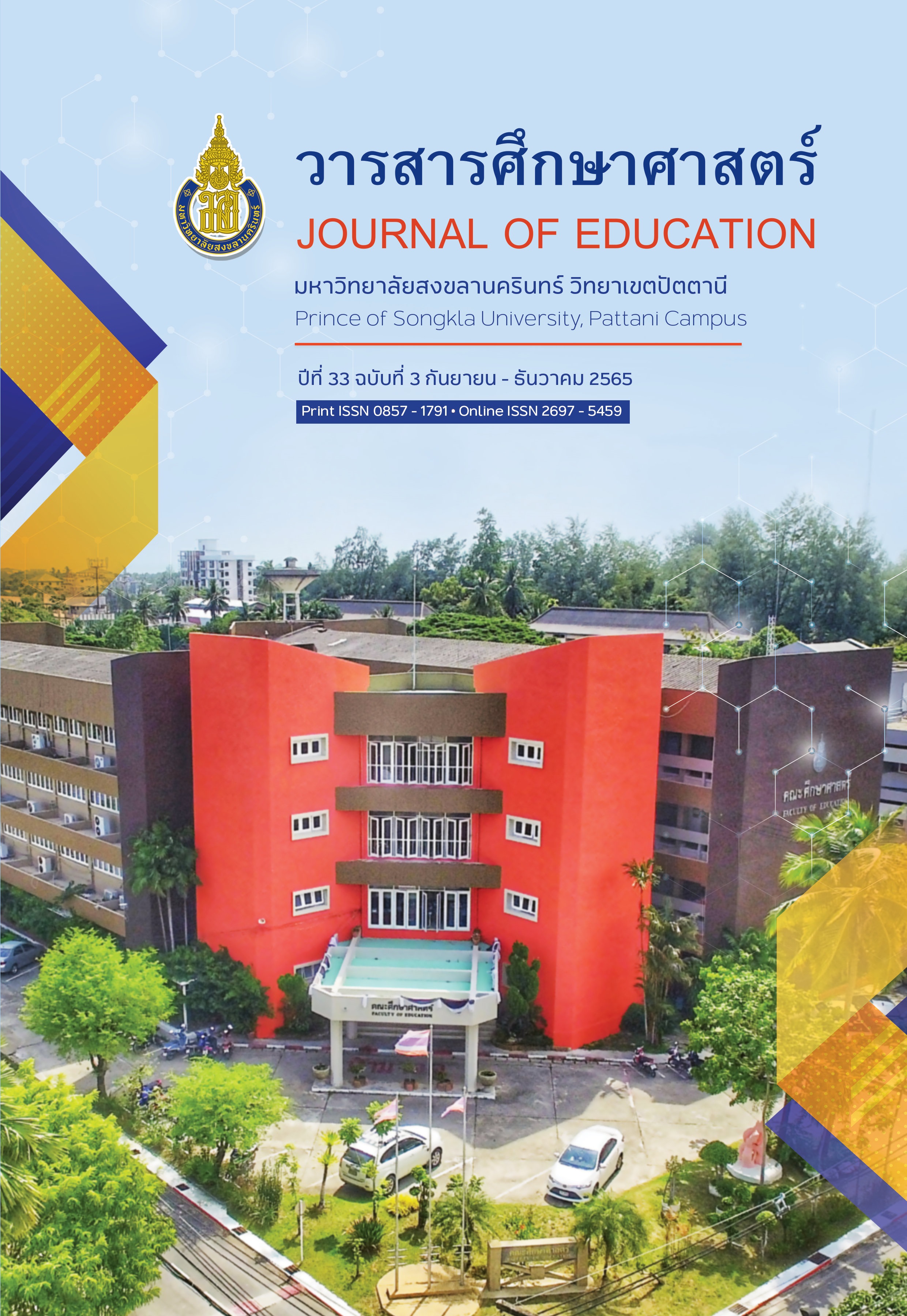การพัฒนากิจกรรมการเรียนรู้โดยใช้วิจัยเป็นฐานที่ส่งผลต่อความก้าวหน้าทางการเรียนของนักศึกษาครูวิทยาศาสตร์ ในรายวิชาวิทยาศาสตร์สิ่งแวดล้อม
Main Article Content
บทคัดย่อ
การศึกษาครั้งนี้เป็นการวิจัยเชิงทดลองเบื้องต้น มีจุดมุ่งหมายเพื่อพัฒนากิจกรรมการเรียนรู้โดยใช้วิจัยเป็นฐานในรายวิชาวิทยาศาสตร์สิ่งแวดล้อมสำหรับนักศึกษาครูวิทยาศาสตร์ และศึกษาความก้าวหน้าทางการเรียนและความพึงพอใจในการเรียนรู้ของนักศึกษาที่ได้เข้าร่วมกิจกรรมการเรียนรู้นี้ ประชากรของการวิจัยคือนักศึกษาครูวิทยาศาสตร์ และกลุ่มเป้าหมายของการวิจัยคือนักศึกษาครูวิทยาศาสตร์ คณะครุศาสตร์ ชั้นปีที่ 3 จำนวน 55 คน ที่ถูกเลือกมาโดยใช้วิธีการเลือกแบบเจาะจง (Purposive Sampling) เครื่องมือวิจัยที่ใช้ได้แก่ 1) คู่มือการจัดกิจกรรมการเรียนรู้และแผนการจัดการเรียนรู้รายวิชาวิทยาศาสตร์สิ่งแวดล้อม 2) แบบทดสอบรายวิชาวิทยาศาสตร์สิ่งแวดล้อมแบบเลือกตอบ จำนวน 90 ข้อ และ 3) แบบสอบถามความพึงพอใจแบบมาตรประมาณค่า 5 ระดับ การวิเคราะห์ข้อมูลวิจัยได้ใช้สมการของ Hake และสถิติอย่างง่าย ผลจากการวิจัยพบว่า 1) กิจกรรมการเรียนรู้โดยใช้วิจัยเป็นฐานที่ถูกออกแบบขึ้นมาใช้สำหรับรายวิชาวิทยาศาสตร์สิ่งแวดล้อมมีความเหมาะสมอยู่ในระดับดีมาก 2) นักศึกษากลุ่มเป้าหมายที่ได้รับการจัดกิจกรรมการเรียนรู้ดังกล่าวมีความก้าวหน้าทางการเรียนอยู่ในระดับปานกลาง โดยนักศึกษาที่มีความสามารถในกลุ่มสูงมีแนวโน้มความก้าวหน้าทางการเรียนมากกว่านักศึกษามีความสามารถในกลุ่มปานกลางและกลุ่มอ่อนด้วยค่าสัมประสิทธิ์สหสัมพันธ์ (R2) เท่ากับ 0.99 และ 3) นักศึกษามีความพึงพอใจที่ได้รับการจัดกิจกรรมการเรียนรู้นี้ในระดับมากที่สุดทุกด้าน ดังนั้นผลจากการวิจัยนี้จึงสนับสนุนให้มีการใช้กิจกรรมการเรียนรู้โดยใช้วิจัยเป็นฐานในการพัฒนาความก้าวหน้าทางการเรียนของนักศึกษาครูวิทยาศาสตร์
Article Details

อนุญาตภายใต้เงื่อนไข Creative Commons Attribution-NonCommercial 4.0 International License.
เอกสารอ้างอิง
Anderson, R. D. (2002). Reforming science teaching: What research says about inquiry. Journal of Science Teacher Education, 13(1), 1-12.
Arico, F., Gillespie, H., Lancaster, S., Ward, N., & Ylonen, A. (2018). Lessons in learning gain: insights from a pilot project. Higher Education Pedagogies, 3(1), 249-265.
Brew, A., & Saunders, C. (2020). Making sense of research-based learning in teacher education. Teaching and Teacher Education, 87, 102935.
Chaidech, T., Chanunan, S., & Chaiyasit, W. C. (2017). Development of collaborative problem solving competency using research-based learning according to stem education in fossil fuels and products. Journal of Research Unit on Science, Technology and Environment for Learning, 8(1), 51-66. [in Thai]
Colt, H. G., Davoudi, M., Murgu, S., & Zamanian Rohani, N. (2011). Measuring learning gain during a one-day introductory bronchoscopy course. Surgical Endoscopy, 25(1), 207-216.
Fitzgerald, M., Danaia, L., & McKinnon, D. H. (2019). Barriers inhibiting inquiry-based science teaching and potential solutions: perceptions of positively inclined early adopters. Research in Science Education, 49(2), 543-566.
Ghani, I. B. A., Ibrahim, N. H., Yahaya, N. A., & Surif, J. (2017). Enhancing students' HOTS in laboratory educational activity by using concept map as an alternative assessment tool. Chemistry Education Research and Practice, 18(4), 849-874.
Hernawati, D., Amin, M., Al Muhdhar, M. H. I., & Indriwati, S. E. (2019). Science literacy skills through the experience of project activities with assisted local potential based learning materials. Jurnal Pendidikan Biologi Indonesia, 5(1), 159-168.
Ketchatturat, J. (2017). Method and tools for students’ learning assessment. KKU Printing House. [in Thai]
Khumraksa, B., & Ruksakit, P. (2019). Improvement of science process skills by using research–based instruction on soil properties for the 2nd grade students in a municipal school, Surat Thani. Journal of Research Unit on Science, Technology and Environment for Learning, 10(1), 14-29. [in Thai]
Khumraksa, B., & Rakbamrung, P. (2020). A Study of the understanding of scientific method of science student teachers who experienced in research-based learning activity. Kasetsart Educational Review, 35(1), 48-56. [in Thai]
Lakdawala, V., Zahorian, A., González, O., Kumar, H. A., & Leath, J. F. (2002). Proceedings of the American Society for Engineering Education Annual Conference & Exposition. ASEE. https://peer.asee.org/collections/7.
Ladachart, L. (2019). First-year preservice biology teachers’ orientations to teaching science. Journal of Education, Prince of Songkla University, Pattani Campus, 30(1), 54-70. [in Thai]
Laugksch, R. C. (2000). Scientific literacy: A conceptual overview. Science Education, 84(1), 71-94.
Millar, R. (2006). Twenty first century science: insights from the design and implementation of a scientific literacy approach in school science. International Journal of Science Education, 28(13), 1499-1521.
Miller, K., Lasry, N., Reshef, O., Dowd, J., Araujo, I., & Mazur, E. (2010). Losing it: The influence of losses on individuals’ normalized gains. AIP Conference Proceedings, 1289(1), 229-232.
OECD. (2019). “PISA 2018 science framework”, in PISA 2018 assessment and analytical framework (pp. 97-117). Paris: OECD Publishing.
Pukiat, L. (2009). Project-based teaching and research-based teaching: Work that elementary teachers can do. Samut Prakan: SAHA & Sons Printing. [in Thai]
Ramsiri, R., & Nillapun, M. (2015). The development of science instructional model by using research-based to enhance research skills, creative problem-solving skills and scientific minds of secondary school students. Silpakorn Educational Research Journal, 7(1), 110-122. [in Thai]
Sriwongsa, K., Chaemlek, O., Panyajirawut, P., & Jearnkulprasert, N. (2020). Study of learning achievement scientific process skills and attitude towards physics in topic of nuclear physics of Mathayomsuksa 6 students by learning management using the research-based learning. Journal of Education Silpakorn University, 18(1), 135-152. [in Thai]
Tomasik, J. H., Cottone, K. E., Heethuis, M. T., & Mueller, A. (2013). Development and preliminary impacts of the implementation of an authentic research-based experiment in general chemistry. Journal of Chemical Education, 90, 1155–1161.
Tomasik, J. H., LeCaptain, D., Murphy, S., Martin, M., Knight, R. M., Harke, M. A., & et al. (2014). Island explorations: Discovering effects of environmental research-based lab activities on analytical chemistry students. Journal of Chemical Education, 91, 1887–1894.
Turner, R. C., & Carlson, L. (2003). Indexes of item-objective congruence for multidimensional items. International Journal of Testing, 3(2), 163-171.
van Uum, M. S. J., Verhoeff, R. P., & Peeters, M. (2016). Inquiry-based science education: towards a pedagogical framework for primary school teachers. International Journal of Science Education, 38(3), 450-469.
Wilson, K. J., & Rigakos, B. (2016). Scientific process flowchart assessment (SPFA): A method for evaluating changes in understanding and visualization of the scientific process in a multidisciplinary student population. CBE life sciences education, 15(4), 1-14.
Zen, E. a. (1990). Science literacy and why it is important. Journal of Geological Education, 38(5), 463-464.
Zohar, A., & Dori, Y. J. (2003). Higher order thinking skills and low-achieving students: Are they mutually exclusive? Journal of the Learning Sciences, 12(2), 145-181.


